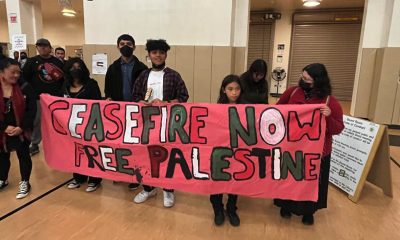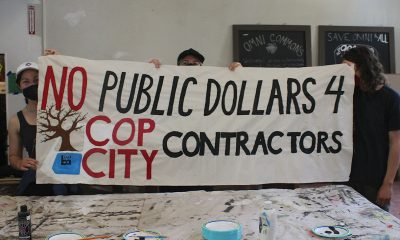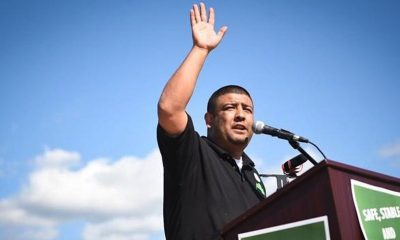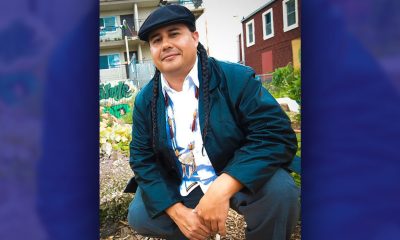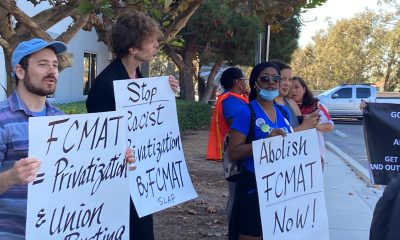Activism
How to Help Black Organizing Project’s Fight to Remove Police from OUSD
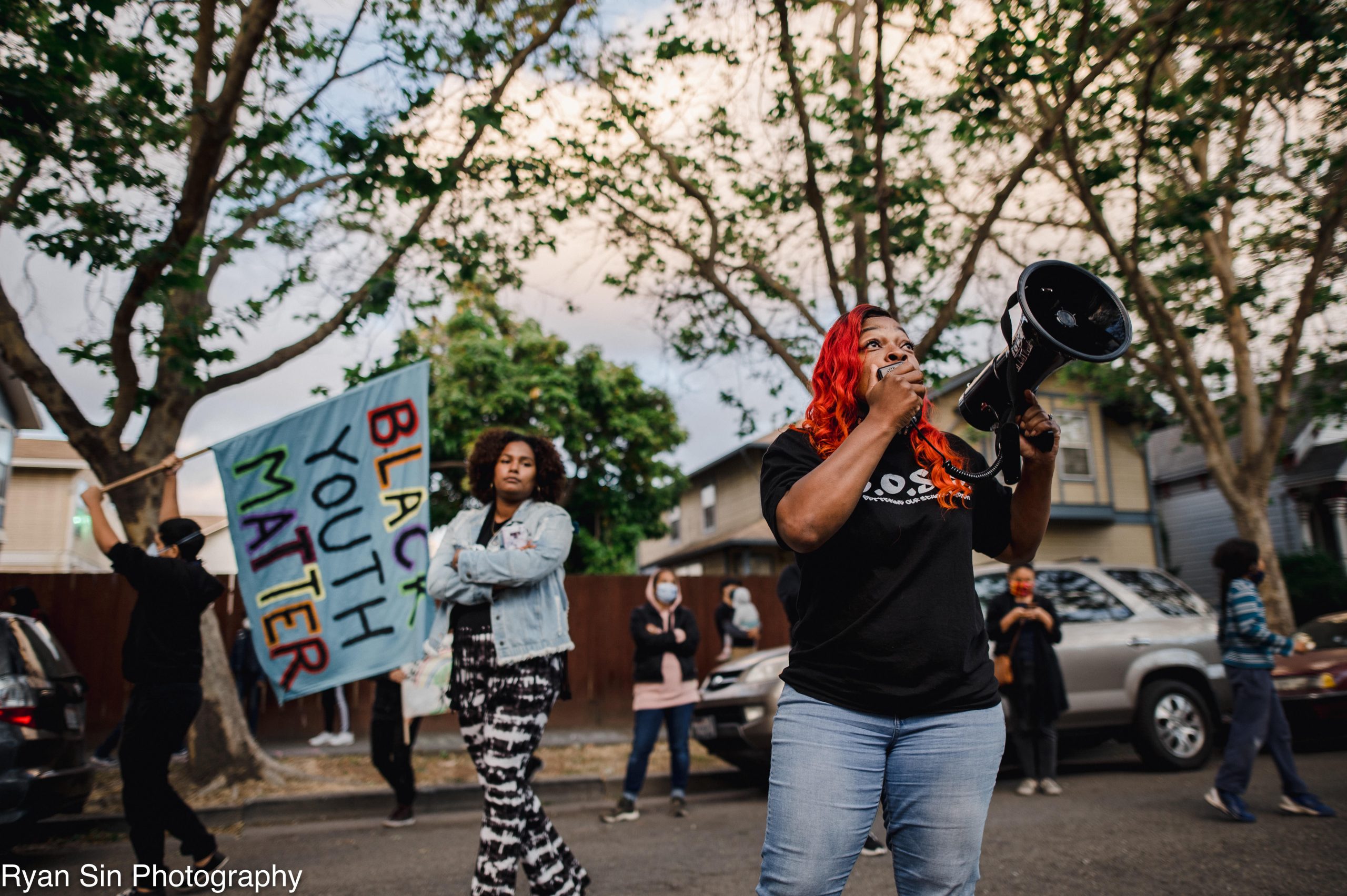
Black Organizing Project (BOP) could reach a goal on June 24 that they have worked toward since 2011: eliminating school police in Oakland’s Unified School District (OUSD), the only district in Alameda County with its own police force.
They are calling on Oakland residents to help them in their final push.
“What is it going to take for this school district to realize the murders [by police] that we are witnessing of our people in the streets are the same police who are in the schools?” asked BOP Director of organizing, Jessica Black, speaking to uproarious cheers from a crowd of around 8,000 at an Oakland protest against policing and a city and county imposed a curfew on June 3.
Black then said just three months earlier, on March 3, Oakland’s school board rejected a measure by one vote that would have drastically cut Oakland Schools Police Department’s (OSPD) budget.
Board members Amy Eng, Shanti Gonzales, and Roseann Torres voted to approve the measure, but Gary Yee, James Harris, Jody London and Jumoke Hinton Hodge voted against it.
Since police officer Derek Chauvin’s killing of George Floyd sparked protests, riots, and rebellions in Minneapolis which brought defunding and even dismantling police forces into the mainstream national conversation, BOP’s mission has found much wider, louder support.
The Oakland Education Association, Asians for Black Lives, Oakland Not for Sale, the Anti-Police Terror Project, Gender and Sexualities Alliance Network, Critical Resistance, Oakland Public Education Network and many Oakland residents, especially teachers, counselors and social workers, have been vocal in their support of BOP’s mission lately.
BOP is now calling on Oaklanders to call, e-mail, and write letters to school board members, especially the four who voted against the previous measure and OUSD Superintendent Kyla Johnson-Trammell, before the final school board meeting on June 24 to demand that they approve a new, more radical measure submitted by Torres and Gonzales called George Floyd Resolution to Eliminate OSPD.
“We can’t let off pressure,” said BOP Executive Director Jackie Byers. “We need those votes. And then on the 24th…[we need people] to get on the Zoom meeting, make public comments or speak to the agenda item.”
Readers can also submit comments during the school board meeting today, June 10.
Torres, who co-wrote the resolution, suggests people should sign up at 5:30 p.m. for public comment and then can watch the meeting or log off till 7:30 p.m. when comments can be heard.
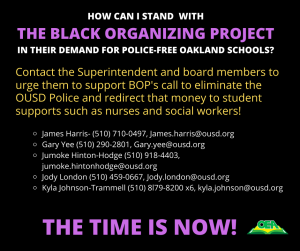
Courtesy of Oakland Education Association.
She says readers can sign up again at 5:30 p.m. on June 24 to speak at 7:30 p.m. for public comment, but they will also have the ability to speak directly to the agenda item that night.
It is unclear at this point when that agenda item will come up, but readers can link with BOP’s Facebook, Twitter or Instagram accounts for the latest info on how to help.
The bill would eliminate OSPD, removing police officers entirely from Oakland schools. It would be the culmination of a nearly decade-long battle that was sparked by the killing of Raheim Brown, Jr. on Jan 22, 2011, by OSPD Sgt. Barhim Bhatt outside of a school dance at Skyline High School. Bhatt claimed he shot Brown five times because Brown attacked another sergeant at the scene, Johnathan Bellusa, with a screwdriver. But Bellusa later claimed Bhatt may have fired unnecessarily and that OUSD prevented a proper investigation.
OSPD’s website lists that it has around 20 police officers and around 120 school security officers (SSO) but BOP says due to cuts in recent years, that number is now around 10 police officers and 60 SSOs.
All of these employees serve under Police Chief Jeff Godown, an officer who served in Los Angeles during the Rodney King riots.
SSOs have some documented history of use-of-force on minors.
In 2014, there were two separate incidents caught on camera. At Oakland High School an SSO punched a student four times who uses a wheelchair and has cerebral palsy after an altercation over the student possibly skipping class. The SSO was later convicted on one felony count of assault.
SSO officers in Fremont High School put another 15-year-old student in a chokehold, dragged him, and exchanged punches with him.
But BOP says overt acts of violence are not the only threat to students that police systems in schools pose.
Black students, especially, experience more subtle forms of damage from the punitive system that police-based models foster. While suspension rates for Black students have fallen in recent years, they still get suspended at a rate about three times higher than non-Black students.
“Black students aren’t seen in the way that white children are,” said Byers. “They’re seen as a threat from a very early age.”
Byers said the very presence of police brings trauma to Black students.
“Our students don’t feel safe when they’re around law enforcement in the way white students might feel safe,’ she said. “[They’re] constantly barraged with a reality and imagery of law enforcement murdering Black people, including young people…those images are in the psyche of Black students.”
Byers also said many Black students who live in public housing and use public transportation more often than white students are forced to interact with law enforcement constantly, as both BART and the public housing authority have their own police force.
When police are in schools as well, it becomes yet another site of trauma.
Jasmine Williams, BOP’s communications manager, said eliminating OSPD would mean eliminating all police officers and the school police chief. Funding from those cuts could be used “for hiring additional school-based counseling/mental/behavior health staff,” according to BOP’s People’s Plan for Police Free Schools.
“Counselors and therapists won’t have to rely on security to react to adolescent behavior,” said Williams.
SSOs would be retrained and transformed into peacekeepers, or school climate specialists. They would no longer wear uniforms. They have never been armed and they would continue not to be armed.
Williams said she’s heard reports from principals, teachers and students that some current SSOs have positive relationships with students and act as mentions. But the structure is not in place to encourage those relationships in a widespread way.
“If you say these people can act as mentors let’s support that and not create a punitive model,” said Williams.
Activism
S.F. Black Leaders Rally to Protest, Discuss ‘Epidemic’ of Racial Slurs Against Black Students in SF Public School System
Parents at the meeting spoke of their children as no longer feeling safe in school because of bullying and discrimination. Parents also said that reported incidents such as racial slurs and intimidation are not dealt with to their satisfaction and feel ignored.

By Carla Thomas
San Francisco’s Third Baptist Church hosted a rally and meeting Sunday to discuss hatred toward African American students of the San Francisco Unified School District (SFUSD).
Rev. Amos C. Brown, president of the San Francisco NAACP and pastor of Third Baptist Church, along with leadership from local civil rights groups, the city’s faith-based community and Black community leadership convened at the church.
“There has been an epidemic of racial slurs and mistreatment of Black children in our public schools in the city,” said Brown. “This will not be tolerated.”
According to civil rights advocate Mattie Scott, students from elementary to high school have reported an extraordinary amount of racial slurs directed at them.
“There is a surge of overt racism in the schools, and our children should not be subjected to this,” said Scott. “Students are in school to learn, develop, and grow, not be hated on,” said Scott. “The parents of the children feel they have not received the support necessary to protect their children.”
Attendees were briefed last Friday in a meeting with SFUSD Superintendent Dr. Matt Wayne.
SFUSD states that their policies protect children and they are not at liberty to publicly discuss the issues to protect the children’s privacy.
Parents at the meeting spoke of their children as no longer feeling safe in school because of bullying and discrimination. Parents also said that reported incidents such as racial slurs and intimidation are not dealt with to their satisfaction and feel ignored.
Some parents said they have removed their students from school while other parents and community leaders called on the removal of the SFUSD superintendent, the firing of certain school principals and the need for more supportive school board members.
Community advocates discussed boycotting the schools and creating Freedom Schools led by Black leaders and educators, reassuring parents that their child’s wellbeing and education are the highest priority and youth are not to be disrupted by racism or policies that don’t support them.
Virginia Marshall, chair of the San Francisco NAACP’s education committee, offered encouragement to the parents and students in attendance while also announcing an upcoming May 14 school board meeting to demand accountability over their mistreatment.
“I’m urging anyone that cares about our students to pack the May 14 school board meeting,” said Marshall.
This resource was supported in whole or in part by funding provided by the State of California, administered by the California State Library via California Black Media as part of the Stop the Hate Program. The program is supported by partnership with California Department of Social Services and the California Commission on Asian and Pacific Islander American Affairs as part of the Stop the Hate program. To report a hate incident or hate crime and get support, go to CA vs Hate.
Activism
Oakland Ambassadors Strengthen Ties and Aid Efforts in Ghana
Oakland natives and esteemed members of the African American Sports and Entertainment Group (AASEG), Jonathan P. Jones and Dr. Maritony Efua Jones, recently embarked on a significant journey to Ghana as guests of the World Martial Authority Ghana. This trip signifies a crucial opportunity to bolster partnerships, explore new avenues of collaboration, and contribute to impactful initiatives in Ghana.
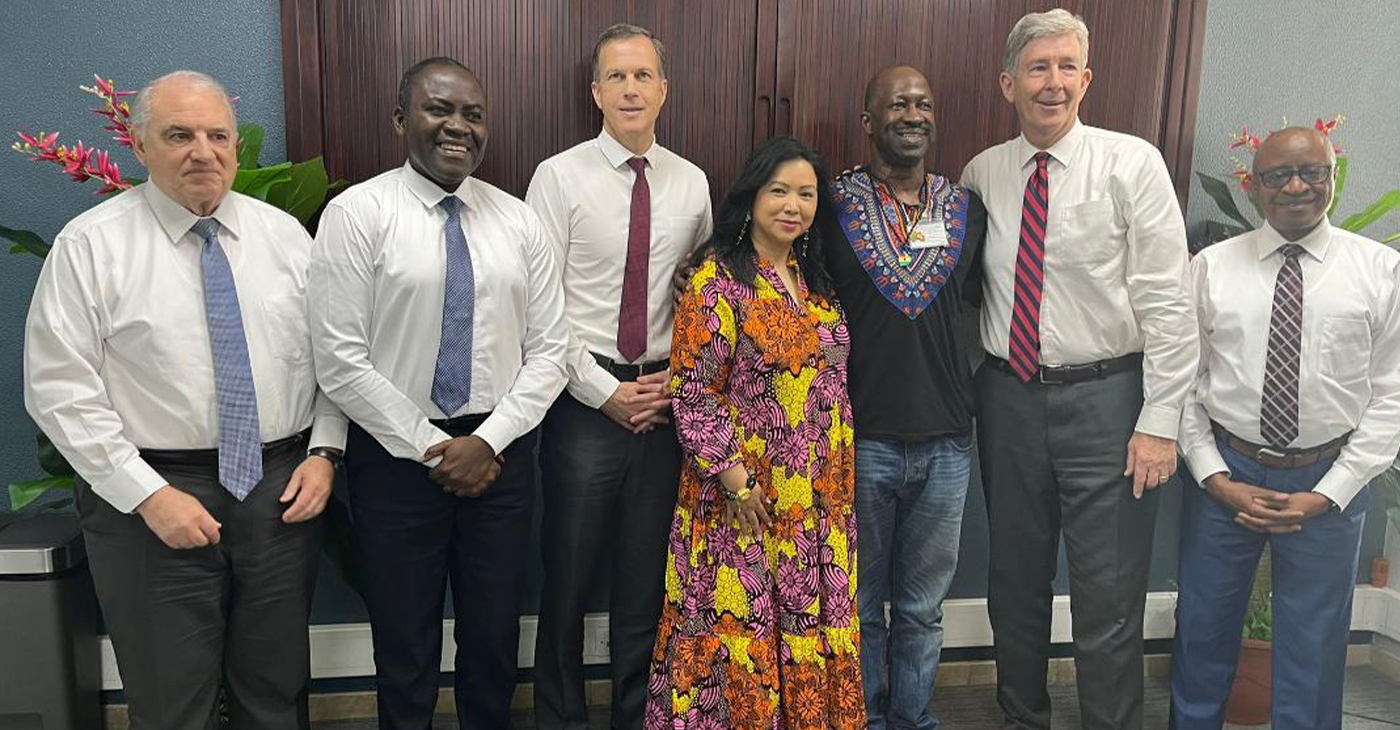
By Post Staff
Oakland natives and esteemed members of the African American Sports and Entertainment Group (AASEG), Jonathan P. Jones and Dr. Maritony Efua Jones, recently embarked on a significant journey to Ghana as guests of the World Martial Authority Ghana.
This trip signifies a crucial opportunity to bolster partnerships, explore new avenues of collaboration, and contribute to impactful initiatives in Ghana.
Upon their arrival at Katota Airport in Accra, Ghana, the Joneses were warmly received by His Royal Majesty Okatakyie Asafo Boakye III, the distinguished king of Sanzule Kingdom in the Eastern Nzema, and Etse Nyamedi of World Martial Authority, Ghana.
Nyamedi accompanied the Joneses to the city of Mepe, which had recently experienced flooding, to assess damages and engage with local leaders, elders, and youth regarding the city’s urgent needs after major floods last fall.
Key concerns and priorities identified by the community include comprehensive flood mitigation measures, agricultural support, housing initiatives, educational enhancements, improved healthcare access, and the development of communal recreational spaces.
The Joneses were also graciously invited to meet with leaders of The Church of Jesus Christ of Latter-day Saints at their headquarters in Accra. This meeting provided insights into ongoing humanitarian efforts in Ghana and explored avenues for collaboration to further assist Ghanaian communities.
The LDS leaders shared their prompt response to the recent flood, demonstrating their commitment to humanitarian aid by dispatching substantial supplies including medical provisions, sanitation items, blankets, and food to assist flood victims just four days after the disaster.
Additionally, Boakye extended a special invitation to the Joneses to his palace, where they were pleasantly surprised with a heartfelt recognition ceremony. Maritony Jones was honored as the Queen Mother of the Sanzule Kingdom in acknowledgment of her dedicated work, while Jonathan Jones was lauded and welcomed as the ambassador of the Sanzule Kingdom, symbolizing a meaningful homecoming to their ancestral land.
The visit not only strengthens ties between Oakland and Ghana but also underscores the collaborative spirit and commitment to meaningful progress and humanitarian endeavors shared by all involved parties.
Activism
Calif. Anti-Sex Trafficking Advocates Discuss Competing Bills, Strategies
Advocates from across California are challenging state officials and community leaders to support legislation that provides resources and services for survivors and victims of human trafficking, as well as assistance as they transition back into civil society. Some of those advocates are also calling for more effective state policy to curtail trafficking, a crime that has an outsized impact on Black children, particularly girls.
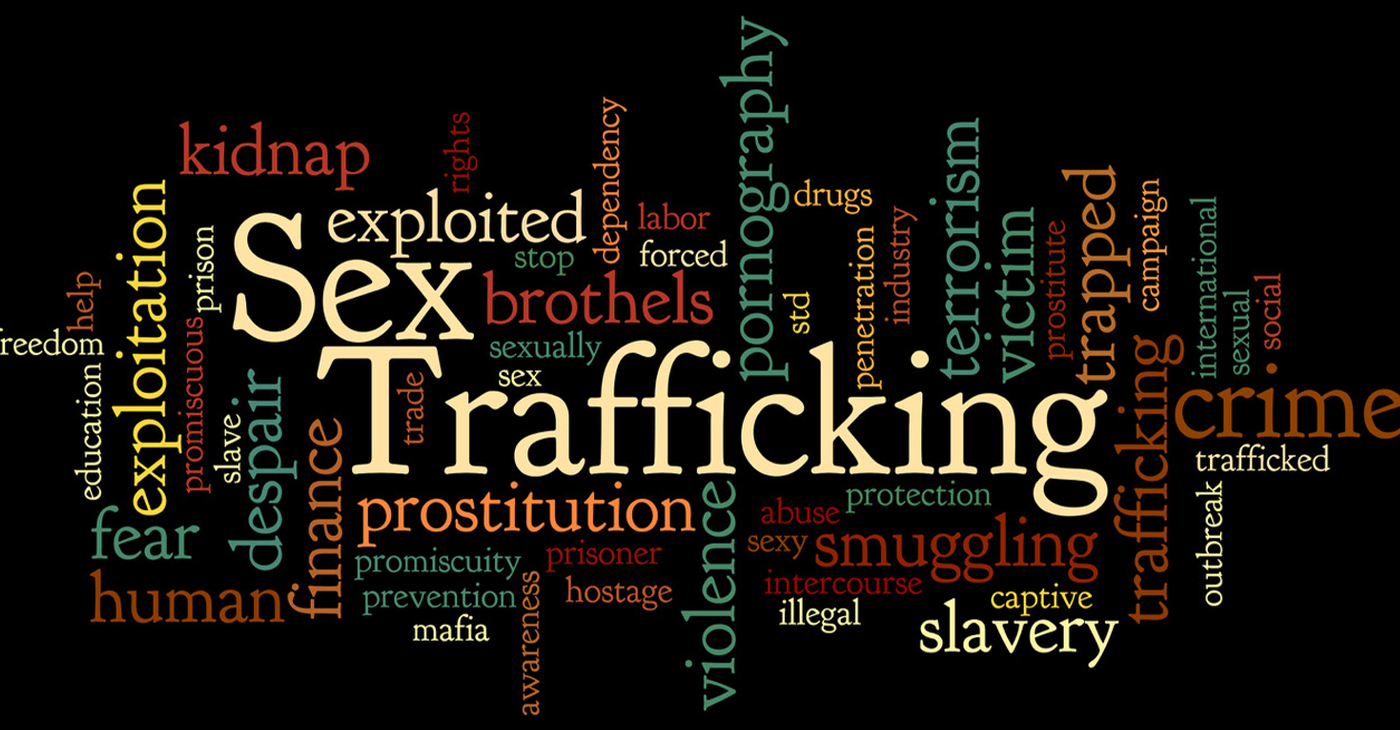
By Bo Tefu, California Black Media
Advocates from across California are challenging state officials and community leaders to support legislation that provides resources and services for survivors and victims of human trafficking, as well as assistance as they transition back into civil society.
Some of those advocates are also calling for more effective state policy to curtail trafficking, a crime that has an outsized impact on Black children, particularly girls.
According to the FBI, a report covering a two-year period found Black children accounted for 57% of all juvenile arrests for prostitution. In addition, 40% of sex trafficking victims were Black and 60% of those victims had been enrolled in the foster care system.
“It is time to hold the perpetrators who take advantage of our children accountable,” said the Rev. Shane Harris, a San Diego-based activist, former foster youth and founder of the Peoples Association of Justice Advocates, (PAJA), a national civil rights organization and policy think tank.
“It is time to send a thorough message that if you seek to buy a child for sex, you will pay the highest criminal penalties in this state,” added Harris who was speaking at a rally at the State Capitol earlier this month. Harris was speaking in support of Senate Bill 1414, authored by Sen. Shannon Grove (D-Bakersfield), which calls for people who buy sex from minors to be punished with a felony. The punishment includes a two-year prison sentence and a $25,000 fine.
Harris said the PAJA is the only civil rights organization in the state that supports SB 1414.
Harris urged other Black-led groups who favor anti-trafficking legislation more focused on criminal justice reforms (as opposed to stiffer penalties), to “join the movement.”
Many of those civil rights groups fear that SB 1414 could lead to the incarceration of more Black youth.
Those sentiments were echoed in a panel discussion organized by Black women advocates on April 26 to examine the cause and effects of human trafficking in California’s Black communities. The virtual event was hosted by the Forgotten Children, Inc, a faith-based nonprofit that advocates for survivors and victims of human trafficking through anti-trafficking campaigns and initiatives.
Panelists shared the psychological impact of sexual exploitation on youth and children in the long term.
Author and educator Dr. Stephany Powell shared statistics and information revealing that African American women and girls are the most trafficked nationwide.
Powell, who serves as the senior advisor on law enforcement and policy at the National Center on Sexual Exploitation said that national data indicates that sex trade survivors are disproportionately women of color. She stated that male survivors often go unnoticed because boys rarely report trafficked crimes.
Powell said that decriminalizing prostitution in California could increase human trafficking. She argued that Senate Bill 357, authored by Sen. Scott Wiener (D-San Francisco), which was signed into law in 2022 and legalized loitering for prostitution, caused a surge in street-level prostitution.
Panelist and psychologist Dr. Gloria Morrow shared opposing views on decriminalizing prostitution. She said that decriminalizing prostitution could help survivors gain access to state resources and support.
Despite opposing views, Powell and Morrow agree that the Black community needs resources and educational programs to address human trafficking.
-

 Community3 weeks ago
Community3 weeks agoFinancial Assistance Bill for Descendants of Enslaved Persons to Help Them Purchase, Own, or Maintain a Home
-

 Business3 weeks ago
Business3 weeks agoV.P. Kamala Harris: Americans With Criminal Records Will Soon Be Eligible for SBA Loans
-

 Activism3 weeks ago
Activism3 weeks agoOakland Post: Week of April 10 – 16, 2024
-

 Community3 weeks ago
Community3 weeks agoAG Bonta Says Oakland School Leaders Should Comply with State Laws to Avoid ‘Disparate Harm’ When Closing or Merging Schools
-

 Community2 weeks ago
Community2 weeks agoRichmond Nonprofit Helps Ex-Felons Get Back on Their Feet
-

 Community2 weeks ago
Community2 weeks agoOakland WNBA Player to be Inducted Into Hall of Fame
-

 Activism1 week ago
Activism1 week agoOakland Post: Week of April 24 – 30, 2024
-

 Community2 weeks ago
Community2 weeks agoRPAL to Rename Technology Center for Retired Police Captain Arthur Lee Johnson


